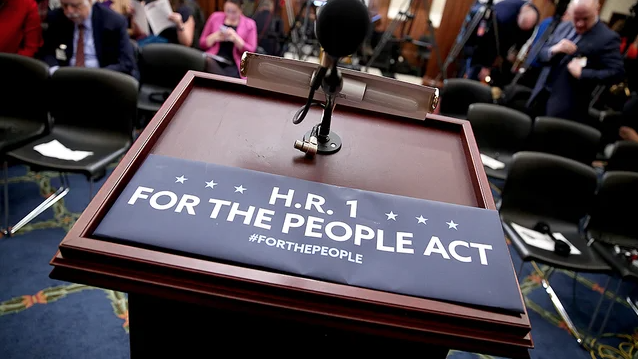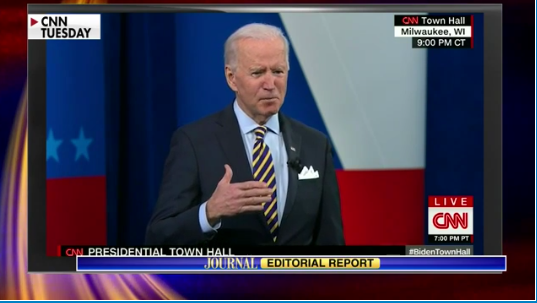
Yesterday, the House passed sweeping voting rights legislation that’s been on Congressional Democrats’ wishlist since 2018. The nearly 800-page H.R. 1, For the People Act, would make federal updates to absentee voting, in-person voting, campaign finance and ethics reform measures.
Polling from 2019 and this year shows the bill is broadly popular with the public, but previous legislation did not pass in the Republican-led Senate in 2019. Even with the current slim Democratic control (a 50-50 Senate with Vice President Kamala Harris as the tiebreaker), it will be incredibly difficult to pass with the required 60 votes to avoid the Senate filibuster.
Learn more about the filibuster and in our U.S. Senate Policy Circle Brief, and stay up-to-date on the Senate calendar here.
Supporters of the bill say the goal of the legislation is to counter voter suppression, partisan gerrymandering and the influence of special-interest groups. The legislation is a voting reform wishlist for Congressional Democrats, but also includes some policies that have been supported by state officials in red states or backed by Congressional Republicans, the Campaign Legal Center, which supports the legislation, notes.
Those who oppose say the legislation oversteps states’ rights. Historically, states have set most details of election laws. The Heritage Foundation says H.R. 1 would “federalize and micromanage the election process, imposing unnecessary, unwise, and unconstitutional mandates on the states.”
What’s in the Bill?
Voting Rights
- Creates new national automatic voter registration that asks voters to opt-out rather than opt-in, ensuring more people will be signed up to vote.
- Requires chief state election officials to automatically register eligible unregistered citizens. 40 states and the District of Columbia currently offer online and same-day registration.
- Prohibits voter roll purging and bans the use of non-forwardable mail being used as a way to remove voters from rolls.
- Restores voting rights to people convicted of felonies who have completed their sentences; however, the bill doesn’t restore rights to felons currently serving sentences in a correctional facility. This has historically been decided on a state-by-state basis.
- Establishes independent redistricting commissions in states and bars states from restricting the ability to vote by mail.
Campaign Finance Reform
- The bill takes aim at Citizens United, the landmark 2010 Supreme Court decision, by calling for a constitutional amendment to overturn the ruling.
- Sets up a new public financing system for congressional and presidential elections to incentivize small-dollar donations. The legislation would establish a 6:1 match for each grassroots contribution to a candidate up to $200 a long-standing goal of the bill’s author, Maryland Rep. John Sarbanes. For example: Taxpayers would fund 6x a donation of up to $200 — so a donation of $200 = $1,200 with $1,000 paid by the government.
- Institutes an ethics code for the U.S. Supreme Court that would apply to justices and would implement measures intended to prevent presidential conflicts of interest. This would also apply to the other branches of government and those who serve.
- Includes the Disclose Act, which requires super PACs to make their donors public, and prohibits any coordination between candidates and super PACs. Also includes the Honest Ads Act which would require Facebook and Twitter to disclose the source of money for political ads on their platforms and the amount spent.
Regulating Freedom of Speech
Parts of the bill target the dissemination of deceptive speech and raise questions about freedom of expression. If enacted into law and challenged in court, the government would need to prove those parts of the law serve a compelling interest and were narrowly drafted.
The Institute for Free Speech notes the provisions in H.R. 1 “are so complex and open to so many possible interpretations that the Institute’s views may well understate the chill this legislation would impose on speech.”
The bill has also resulted in some unusual allies: the RNC and the ACLU. The ACLU told lawmakers in 2019 that it opposed the bill. The group said it supported provisions to expand voting rights but opposed campaign finance provisions that it said would limit free speech. The group told lawmakers this month that it had “significant constitutional concerns” about the legislation as proposed, which the Republican National Committee chair shared.
Take Action
- For more, dive into our Policy Circle Briefs on Election Integrity, Campaign Finance and Freedom of Speech.
- Dive into Free Speech with our latest Move the Needle series on the topic.
- Watch this series from A Starting Point highlighting what Congressional lawmakers have to say about voting rights in America.
- Research your state voting laws and current proposals on campaign finance.
Other News

Stepping Up the Tech Fight Against China
For a change, some good news: The Journal reports that the Biden administration is in the early stages of building a “tech alliance” against China.
Take action: Learn more about the digital landscape in our policy circle brief.

What #DeleteFacebook tech bros don’t get: Without viable alternatives, walking away is still a privilege
We need to start listening to people who are concerned about closing their accounts and building tools that can fulfill their needs.
Take action: Learn more about free speech in our Policy Circle Brief.

Why Is Facebook Launching An All-Out War On Apple’s Upcoming iPhone Update?
West Virginia has administered almost 450,000 doses of COVID-19 vaccine. More than 9% of its population has gotten both doses.
Take action: Register for our upcoming event on Big Tech, privacy and innovation.
Interested in diving deeper into these issues? Check out our latest events on Big Tech, censorship, free speech and more.
The Policy Circle is a 501(c)(3), nonpartisan organization that provides pathways for women to become courageous, knowledgeable and active citizens who identify and take ownership of local solutions to the issues facing their communities. Please consider supporting our mission and developing your own leadership skills by becoming a financial supporter.
Want to share your Policy Circle story? Email us at communications@thepolicycircle.org to learn how to get involved. And follow us on social: Facebook, Instagram, Twitter and LinkedIn.